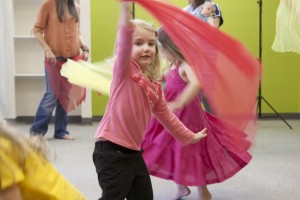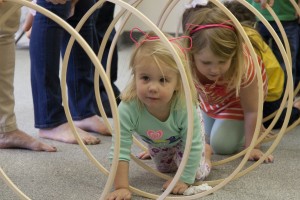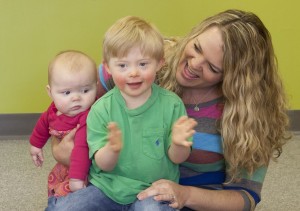Last week an enthusiastic father in my toddler music class announced to the class that his daughter learned to sing two new songs this week. While both songs (If I had a Hammer and Puff the Magic Dragon) are wonderful songs by themselves, I wondered why he wasn’t enthusiastically sharing how his daughter was singing two of her favorite songs from her class recording. So I asked the question every Musikgarten teacher fears asking,
“Have you downloaded (or listened) to your classroom music yet?”
As a teacher I bet you will cringe when you hear the myriad of excuses why parents haven’t gotten around to doing this simple and important act, and as a parent I bet you guiltily look for that code to download the songs onto your listening device or search for your CD.
Why would children and parents listening to the music at home be so important to the success of your program? Here are five important reasons to consider:
Familiarity breeds success: Children love to hear a song over and over and over again. They will request the music on every car trip. When they enter the classroom they embrace the activity because they KNOW the songs from listening to the recording at home.
Children singing on recordings: All Musikgarten recordings have children singing several of the songs, sometimes in a children’s choir and other times as a solo. This is magical for children because they love hearing other children sing. They can easily sing along because the vocal range is optimal for their voices.
Expands the classroom experience: So often I have parents share how their children are “practicing” their songs. This could be a baby or toddler singing the songs on a syllable like ba or bam in their crib or in their car seat. Or an older child singing a complete song while dancing.
Develops vocabulary: Songs, especially the folk material that Musikgarten uses, are rich in words. When children sing with the recording or later by themselves, they are developing their growing vocabulary.
Parent’s important role: Parents are the model the child will follow. I notice more parents sing in class when they have listened to the recording with their children or on their own. How many times have I heard parents say they continue to listen and hum along to the music long after they drop off their children to school or other activities? Parents love the music!
I always encourage families to listen to as many different types of music and I embrace the tremendous variety of musical choices in our society that we can access 24 hours a day. However, I want to emphasize the strengths of the Musikgarten recordings that are created specifically for young children:
Instrumentation is diverse: This is so important! So many children’s CDs limit their instrumentation to drums, guitar, piano and voice. But take a look at a typical Musikgarten CD. The listener will experience a children’s choir; instruments from the woodwind family like the clarinet, oboe, and bassoon; large orchestras, brass instruments; folk instruments like bamboo flute and jaw’s harp; plus the traditional guitar, drums and piano. Oh, and did I mention an ensemble of Renaissance instruments? When it is time for a child to choose the instrument they wish to study, teacher and parent can be sure they have heard a wide selection of musical instruments before they make that lifelong choice.
Tempo: The tempo of the music is just right for children. I have found when I listen to CDs that are labeled for children they are just too fast. In my classes I am constantly slowing down the speed of the songs we sing to match the speed of the children singing. At the same time, I want the tempos on the recordings to be lively and catchy and the CDs have the speed that is ideal for the children.
The singers are often children: This needs to be repeated! This means a child has a model of singing that is just like their voice. They hear a sound that they can easily understand and recreate.
Music includes activity: Remember in class we don’t just sing a song, we sing and MOVE to the song, whether it is tapping the beat on our knees, rocking to and fro, marching through the room, or playing along with sticks. This brings another dimension to the song, something a recording by itself cannot do.
Share these wonderful attributes about the Musikgarten recordings with your families. Encourage them to find these recordings and make them a part of their daily life.
This father has promised he will spend five minutes and download the music. I hope he will take advantage of this opportunity to share Musikgarten’s excellent music all week and all session long.












 nd promote a few classes “al fresco” – have parents meet you at a local park or under a shady tree near your studio (of course, get permission if it’s not your property.) Ask families to bring picnic blankets or beach towels, and water bottles. Encourage children to listen to the music of nature, like birds singing and leaves blowing in the breeze. You can even have an impromptu summer parade!
nd promote a few classes “al fresco” – have parents meet you at a local park or under a shady tree near your studio (of course, get permission if it’s not your property.) Ask families to bring picnic blankets or beach towels, and water bottles. Encourage children to listen to the music of nature, like birds singing and leaves blowing in the breeze. You can even have an impromptu summer parade!